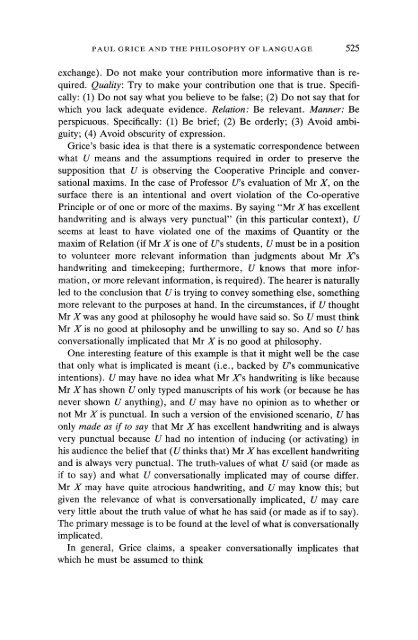Paul Grice and the philosophy of language
Paul Grice and the philosophy of language
Paul Grice and the philosophy of language
Create successful ePaper yourself
Turn your PDF publications into a flip-book with our unique Google optimized e-Paper software.
PAUL GRICE AND THE PHILOSOPHY OF LANGUAGE 525<br />
exchange). Do not make your contribution more informative than is required.<br />
Quality: Try to make your contribution one that is true. Specifically:<br />
(1) Do not say what you believe to be false; (2) Do not say that for<br />
which you lack adequate evidence. Relation: Be relevant. Manner: Be<br />
perspicuous. Specifically: (1) Be brief; (2) Be orderly; (3) Avoid ambiguity;<br />
(4) Avoid obscurity <strong>of</strong> expression.<br />
<strong>Grice</strong>'s basic idea is that <strong>the</strong>re is a systematic correspondence between<br />
what U means <strong>and</strong> <strong>the</strong> assumptions required in order to preserve <strong>the</strong><br />
supposition that U is observing <strong>the</strong> Cooperative Principle <strong>and</strong> conversational<br />
maxims. In <strong>the</strong> case <strong>of</strong> Pr<strong>of</strong>essor U's evaluation <strong>of</strong> Mr X, on <strong>the</strong><br />
surface <strong>the</strong>re is an intentional <strong>and</strong> overt violation <strong>of</strong> <strong>the</strong> Co-operative<br />
Principle or <strong>of</strong> one or more <strong>of</strong> <strong>the</strong> maxims. By saying "Mr X has excellent<br />
h<strong>and</strong>writing <strong>and</strong> is always very punctual" (in this particular context), U<br />
seems at least to have violated one <strong>of</strong> <strong>the</strong> maxims <strong>of</strong> Quantity or <strong>the</strong><br />
maxim <strong>of</strong> Relation (if Mr X is one <strong>of</strong> U's students, U must be in a position<br />
to volunteer more relevant information than judgments about Mr X's<br />
h<strong>and</strong>writing <strong>and</strong> timekeeping; fur<strong>the</strong>rmore, U knows that more information,<br />
or more relevant information, is required). The hearer is naturally<br />
led to <strong>the</strong> conclusion that U is trying to convey something else, something<br />
more relevant to <strong>the</strong> purposes at h<strong>and</strong>. In <strong>the</strong> circumstances, if U thought<br />
Mr X was any good at <strong>philosophy</strong> he would have said so. So U must think<br />
Mr X is no good at <strong>philosophy</strong> <strong>and</strong> be unwilling to say so. And so U has<br />
conversationally implicated that Mr X is no good at <strong>philosophy</strong>.<br />
One interesting feature <strong>of</strong> this example is that it might well be <strong>the</strong> case<br />
that only what is implicated is meant (i.e., backed by U's communicative<br />
intentions). U may have no idea what Mr X's h<strong>and</strong>writing is like because<br />
Mr X has shown U only typed manuscripts <strong>of</strong> his work (or because he has<br />
never shown U anything), <strong>and</strong> U may have no opinion as to whe<strong>the</strong>r or<br />
not Mr X is punctual. In such a version <strong>of</strong> <strong>the</strong> envisioned scenario, U has<br />
only made as if to say that Mr X has excellent h<strong>and</strong>writing <strong>and</strong> is always<br />
very punctual because U had no intention <strong>of</strong> inducing (or activating) in<br />
his audience <strong>the</strong> belief that (U thinks that) Mr X has excellent h<strong>and</strong>writing<br />
<strong>and</strong> is always very punctual. The truth-values <strong>of</strong> what U said (or made as<br />
if to say) <strong>and</strong> what U conversationally implicated may <strong>of</strong> course differ.<br />
Mr X may have quite atrocious h<strong>and</strong>writing, <strong>and</strong> U may know this; but<br />
given <strong>the</strong> relevance <strong>of</strong> what is conversationally implicated, U may care<br />
very little about <strong>the</strong> truth value <strong>of</strong> what he has said (or made as if to say).<br />
The primary message is to be found at <strong>the</strong> level <strong>of</strong> what is conversationally<br />
implicated.<br />
In general, <strong>Grice</strong> claims, a speaker conversationally implicates that<br />
which he must be assumed to think














